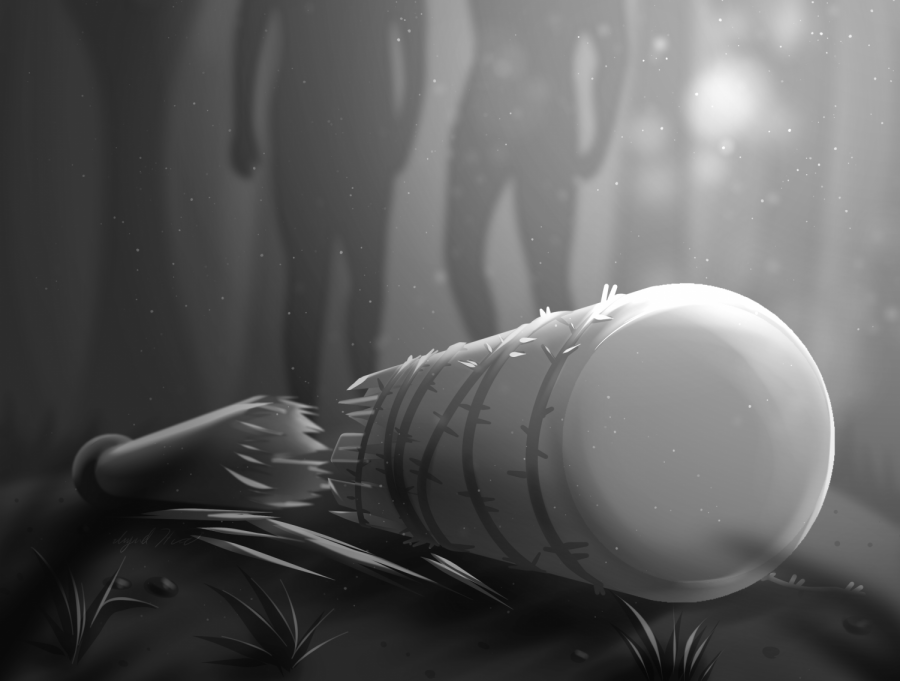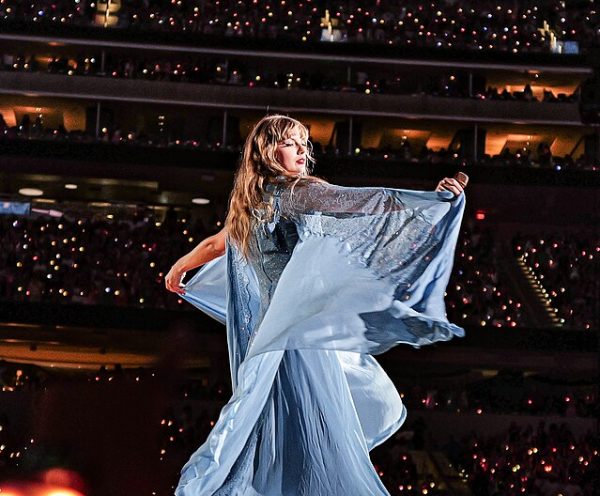It’s time for ‘The Walking Dead’ to return from complacency
February 14, 2018
With the second half of season eight slated to begin on Feb. 25, The Walking Dead left Rick and the rest of its zombie-fighting warriors in yet another perilous situation––and Negan still alive. The season began with Rick, Maggie and Ezekiel (the heads of three allied communities) calling for all-out war with Negan and his Saviors, who have been the primary antagonists of the show since the end of season six. You know, when Negan finally revealed himself and the extent of his horrific (though at times maddeningly charismatic) power by engaging in a sadistic version of “Eeny, meeny, miny, moe” to decide who he was going to bludgeon to death with his prized weapon of choice: a barbed wire-encircled baseball bat he named Lucille.
But, here we are, a season and a half later, and Negan remains our heroes’ greatest foe. And that “all-out war” scenario isn’t exactly living up to its hype, mostly because it’s dragging on. The first half of the current season turned out to be somewhat of a disappointment for me, and it has felt as if this show has been increasingly coming up short for the past couple of years. I used to watch every episode with a palpitating heart and goosebumps-ridden arms, literally on the edge of my seat with the fear and anticipation of these beloved characters’ fates. Recently, the storyline has been making my eyes roll in boredom and annoyance more often than anything else.
So here are the three main goals The Walking Dead needs to achieve by the end of this season to keep me interested:
1. Negan needs to die. Soon. When this villain first made his debut, he was one of the most frightening and merciless antagonists this show had ever seen. Unlike the Governor (remember when you thought he was dead and then he tried to wipe out the prison with a literal tank?), who showed signs of obvious trauma and mental instability, Negan has always seemed very much with it, making his actions all the more stomach-churning. His merciless bludgeoning of not one, but two, adored characters right off the bat (pun not intended) struck a daunting chord that severely crippled the spirits of Rick and his group.
Jeffrey Dean Morgan is a spectacular actor who portrays Negan gut-wrenchingly well, but by this point, the antagonist has become overplayed. The more scenes Negan is in, the less I fear him. It’s as if knowing more about him makes him more human and, as a result, less terrifying. He was much more feared when he stuck to the shadows of the show, the idea of him far more paralyzing than the man himself. By now, Negan simply doesn’t have the potency he originally held, and the longer it takes for him to die, the less satisfying that death will be. One of the most important aspects of quality writing is knowing when to end a storyline. Which brings me to my next point.
2. What about the cure? When we first meet Abraham, Eugene and Rosita in season four, they are on their way to D.C. under the impression that Eugene knows how to cure everyone and end the reign of zombies (or “walkers,” as they’re frequently called) that plagues the planet. But, upon discovering that Eugene lied about this in order ensure his own survival, the trek comes to a grinding halt.
Now, four seasons later, in considering what everyone will do once the omnipresent threat of Negan is no more, setting out on a search for a possible cure is a storyline I would eagerly revisit. The threat of walkers is never going to disappear unless some sort of cure is found. No matter how many are killed, more people will die, and turn, and take their place. Just because Eugene doesn’t know the answer to the issue of our loved ones rising from the dead and trying to eat our guts, doesn’t mean no one does. It seems highly unlikely that not a single government official in D.C. is still alive, or that no small portion of the military remains intact, hiding out somewhere, attempting to solve this issue. The only other time we ventured down this path was all the way back in the first season, when Rick and the group sought ultimately fruitless answers at the CDC.
But a whirlwind of time and events has passed since then. Enough of the wars, enough of the relentless fighting with other groups who can’t stand the idea of living in harmony with anyone else––even though they’re miles apart from one another––unceasingly power-hungry in this lawless world. It’s time to shift gears and look for action and intrigue on a different field. The search for the cure, for anyone in our nation’s capital who can make sense of all this, is the logical next step, and can easily still remain a storyline bursting with realistic uncertainty and peril at every turn. Which makes my last point all the more frustrating.
3. The overdramatic, unrealistic writing needs to reach its end. The reason I began watching this show at all is because the first episode completely hooked me. And every episode after reeled me in even further, gluing me to the complexity of the story and its characters. It was gory and raw and tantalizing while still remaining in the realm of practicality. Don’t get me wrong, that’s an extremely difficult feat to achieve in storytelling, especially on a consistent basis. But for five seasons, The Walking Dead continuously delivered, again and again. Most of season six kept footing on the same level, and it wasn’t really until season seven that I began noticing increasingly frequent overdramatized scenes with characters who simply would not be making these ridiculous mistakes seven seasons into this show.
Two prime examples come to mind: first, when Rick initially meets the Scavengers (that weird group that communicates like agitated toddlers), they take him on top of this hill known as the “Up, Up, Up.” My first thought when he gets to the top is, “He better not get pushed off this hill or I’m going to lose it.” And, of course, not only does he get pushed off, it occurs with a nonchalant one-handed shove, and Rick just goes toppling down, somehow not in the least expecting these mysterious strangers he just met to do that. Really? The man who survived a one-eyed psycho with a tank and a group of actual non-walker cannibals doesn’t see this coming? Secondly, the most recent mid-season finale featured a scene where Rick engages in a one-on-one battle with Negan, at one point actually getting the better of our villain and standing over him with Negan’s own menacing bat, poised to finally end it all––or at least smash his face in pretty hard. But instead, Rick halfheartedly hits him with the non-barbed wire part of the bat, giving Negan the chance to gain an upper hand again. Rick has been wanting to spill Negan’s blood since the moment they met, and now that he has the perfect chance––after a season and half––Rick pulls his punches?
It’s many moments like these in the past couple seasons that have disappointed me, and taken me from the story. With the success of the show, it seems that the writers have gotten complacent, thinking anything they scribble down is golden material. That has not been the case, and it’s time they check themselves.
Between a played-out antagonist, a never-ending war and increasingly subpar writing, The Walking Dead needs to take a serious look ahead and make critical adjustments if the show wants to keep up the prestige and respect it worked so hard to gain.












